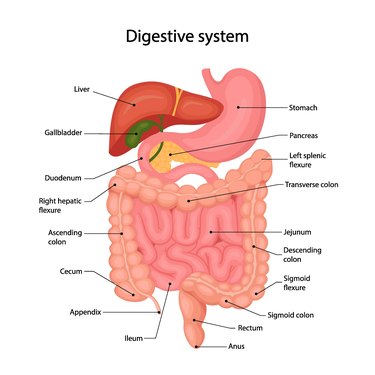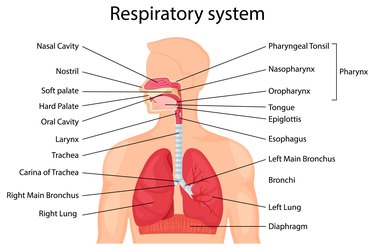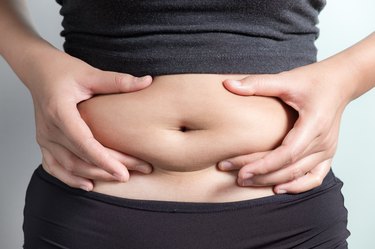
At first glance, your digestive and respiratory systems seem like two separate entities. In reality, though, they work together. So, how does the digestive system work with the respiratory system, and why are digestion and respiration important to the body in the first place?
Broadly, here's how the respiratory system interacts with the digestive system: Breathing provides oxygen to help your digestive tract function, and digestion provides nutrients to fuel your respiratory system, according to Texas A&M University.
Video of the Day
Video of the Day
Furthermore, the systems work together to provide energy to cells to help your entire body function at its best.
Here's an overview of each system, including how the digestive and respiratory systems work together and why digestion and respiration are important to your body.
Digestive Function

Your digestive system is made up of your GI tract (which includes your mouth, esophagus, stomach, small intestine, large intestine and anus) and organs like your liver, pancreas and gallbladder, per the National Institute of Diabetes and Digestive and Kidney Diseases (NIDDK).
It helps you digest the food and fluids you take in every day, breaking down nutrients so your body can absorb them and use them for fuel, growth and repairing cells, according to the NIDDK.
Steps of Digestion
According to the NIDDK, here are the stages of digestion:
- Mouth: You chew your food and pass it into your esophagus.
- Esophagus: Once you swallow, your body automatically activates a process called peristalsis, which is when the muscles in your GI tract sequentially relax and contract to push food through your digestive system.
- Lower esophageal sphincter: As food moves through your esophagus, your sphincter muscle relaxes so it can pass into your stomach.
- Stomach: Food mixes with digestive juices that help break it down.
- Small intestine: Food then passes into the small intestine, where it mixes with more digestive juices from your liver, pancreas and intestine to further break down. During this process, your small intestine absorbs fluid and nutrients.
- Large intestine: Peristalsis moves the leftover waste materials down your GI tract, where the large intestine absorbs water to turn them into stool.
- Rectum: Peristalsis moves stool to your rectum (which is the end of the large intestine), eventually pushing it out your anus during a bowel movement.
Respiratory Function

Your respiratory system is a group of organs and tissues that help you breathe, according to the Cleveland Clinic. It's is made up of your mouth, nose, sinuses, throat, trachea, bronchial tubes, lungs, diaphragm, larynx, ribs, blood vessels and the muscles and tissues that help these parts function.
The respiratory system takes in oxygen from your environment and moves it through your body. And per the Cleveland Clinic, your respiratory system doesn't just allow you to breathe — it also helps with the following processes:
- Talking
- Smelling
- Keeping the air in your body at the right temperature and humidity level
- Delivering oxygen to cells
- Removing waste gases (like carbon dioxide) from your body
- Protecting your airways from harmful substances and irritants
Steps of Respiration
Per the Cleveland Clinic, here's a step-by-step guide to your respiratory system's functioning:
- Your mouth and nose pull in air from your environment.
- The air travels to your lungs.
- Your lungs remove oxygen from the air and pass it into your bloodstream.
- Blood carries oxygen throughout your body to nourish organs, tissues and cells.
- Your blood carries carbon dioxide and other waste, which is released from your body when you exhale.
Tip
Your brain helps your respiratory system regulate respiration rate, which can slow down or speed up depending on factors like physical activity or sickness, per the National Heart, Lung and Blood Institute.
Digestive Dependence Upon Respiration
You know why digestion and respiration are important to the body. Now, here's how the respiratory system works with the digestive system.
Your digestive system needs your respiratory system to provide oxygen to support its functions, including fueling peristalsis to move food through the digestive process, per Texas A&M University.
The respiratory system also aids the digestive system by removing waste products that cells produce during digestion, such as carbon dioxide.
Respiratory Dependence Upon Digestion
The other side of the coin is true as well: Your respiratory system also depends on digestion.
Here's how the respiratory and digestive systems interact: Your digestive system (and the resulting absorption of nutrients from your food) provides your respiratory organs and tissue with the nutrients they need to work properly, per Texas A&M University.
Without adequate fuel, your muscles wouldn't have the energy they need to contract, which moves oxygen through your airways and into the rest of your body, according to the Cleveland Clinic.
Cellular Dependence Upon Both Systems
Your digestive and respiratory systems don't just interact with each other — they also contribute to the health and functioning of your entire body, down to your cells.
Here's how digestion relates to cellular respiration: It provides fuel and nutrients for your cells so they can do their jobs, per Texas A&M University. Similarly, your respiratory system delivers oxygen to your cells to support their functioning, according to the Cleveland Clinic.
Is this an emergency? If you are experiencing serious medical symptoms, please see the National Library of Medicine’s list of signs you need emergency medical attention or call 911.


